What is keyword research?
This is one of the fundamental questions most beginner SEOs and marketers ask as they start their journey to mastering search engine optimization.
Keyword research is identifying and analyzing the specific words and phrases (keywords) used when searching for information, products, or services on search engines like Google.
The goal of keyword research is to understand the language and terms used by your target audience so that you can optimize your blog posts with those keywords.
That way, you increase the chances of your website appearing in search engine results when users search for those particular keywords.
What’s Involved in Keyword Research?
Keyword research involves several steps, including:
1. Brainstorming: Generating a list of potential keyword ideas and phrases that are relevant to your business, industry, or topic.
2. Keyword Expansion: Using keyword research tools, such as Google Keyword Planner, SEMrush, or Ahrefs, to discover additional keywords related to your initial list. These tools provide data on search volume, competition, and other metrics to help you evaluate the potential value of each keyword.
3. Keyword Analysis: Assessing the competitiveness and search volume of the keywords to determine which ones are most valuable for your website or content. High search volume and low competition are desirable attributes for keywords.
4. Keyword Selection: Choosing the keywords that are most relevant, have a reasonable search volume, and align with your content strategy. It’s important to target keywords that match the intent of your target audience.
5. Content Optimization: Incorporating the selected keywords strategically into your website’s meta tags, headings, body content, URLs, and other on-page elements. This helps search engines understand the relevance of your content to specific search queries.
6. Monitoring and Refinement: Continuously monitoring the performance of your keywords and making adjustments as needed. Keyword trends and search patterns can change over time, so it’s important to stay updated and adapt your strategy accordingly.
Effective keyword research enables you to understand your target audience’s language, improve your website’s visibility in search results, attract relevant traffic, and ultimately increase the chances of achieving your desired goals, whether that’s generating leads, driving sales, or gaining more visibility online.
1. What is a Keyword?
A keyword is a search term people type into Google.

Some people refer to longer keywords as “keyword phrases” or “key phrases.” They are effectively the same.
Why Do Keywords Matter?
Imagine answering a question no one is asking. That would not be helpful to anyone.
Think of keywords as a question. People are asking questions.
Questions about your industry. Questions about your product. Even questions about your exact brand.
Are you answering?
This “conversation” is happening on the Internet whether or not you’re a part of it.
How Do I “Answer” Questions People Are Typing Into Google?
By writing content.
That used to involve hiring a writer, dealing with writing teams, editing, and deadlines.
Now, you can do it with Content at Scale.
How Hard is it to Write Content with BrandWell?
If you can copy/paste, you can write great content using BrandWell.
All you need is a keyword.
You don’t need a brief. You don’t need an outline. You don’t need any special instructions or anything.
If you simply put a keyword into BrandWell, our AI will go research everything about that keyword. It knows:
- What words to use
- How many words to use
- What the outline should be
- How many external links to use
- What other keywords to use
- What reading level to use
- and so much more
How Do I Find “Keywords”?
With paid keyword tools like:
You can also use free keyword research tools like Google’s Keyword Planner.
Alternatively, if you use an AI content marketing automation tool like BrandWell, you can use the in-app Keyword Research tool.

Simply click the Keyword Research tab and enter your seed keyword. BrandWell will then generate keywords for you.
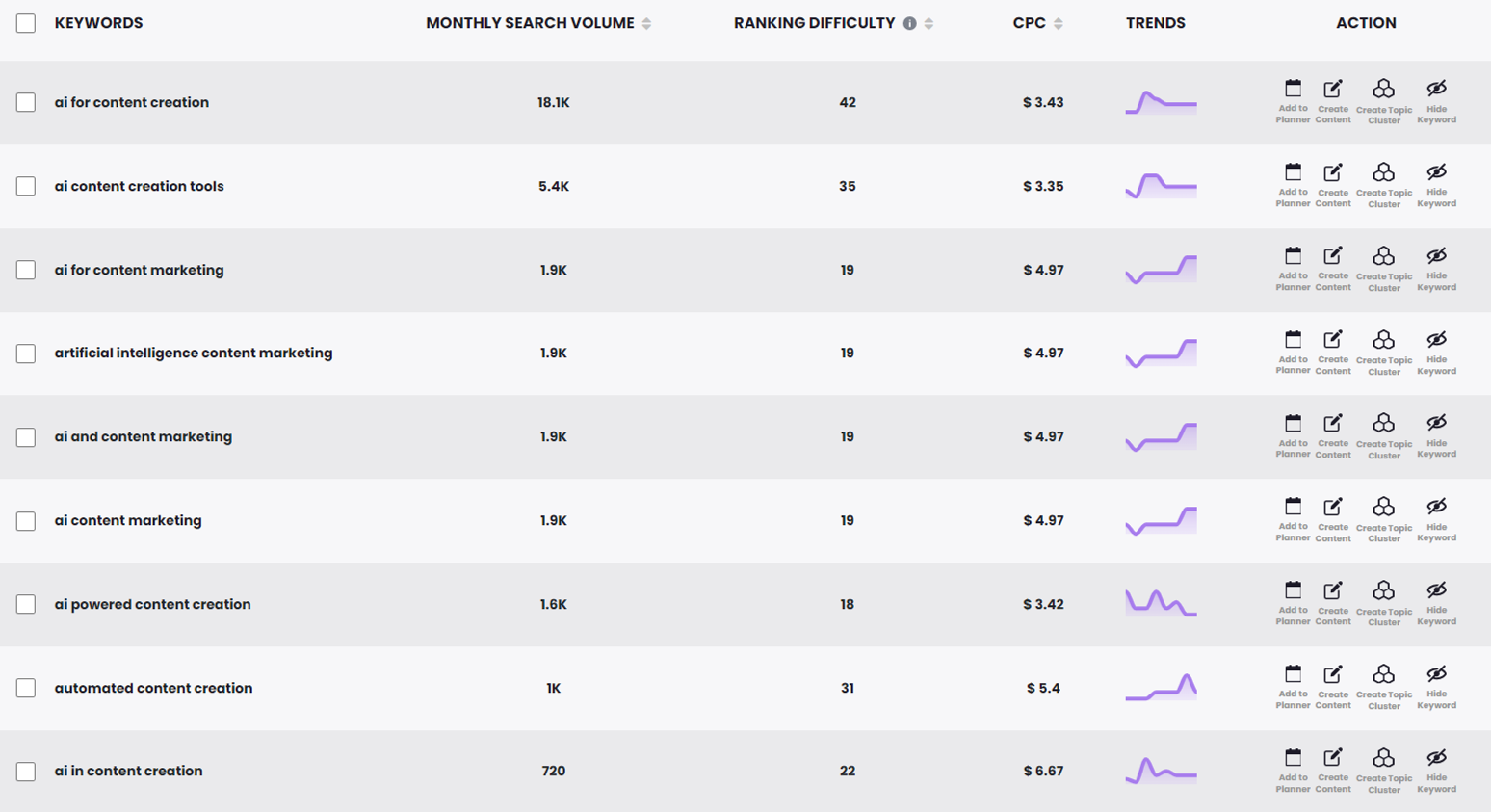
You can even select the keywords you want to use and automate specific actions like adding them to your Content Planner or have the AI write the content with just one click.
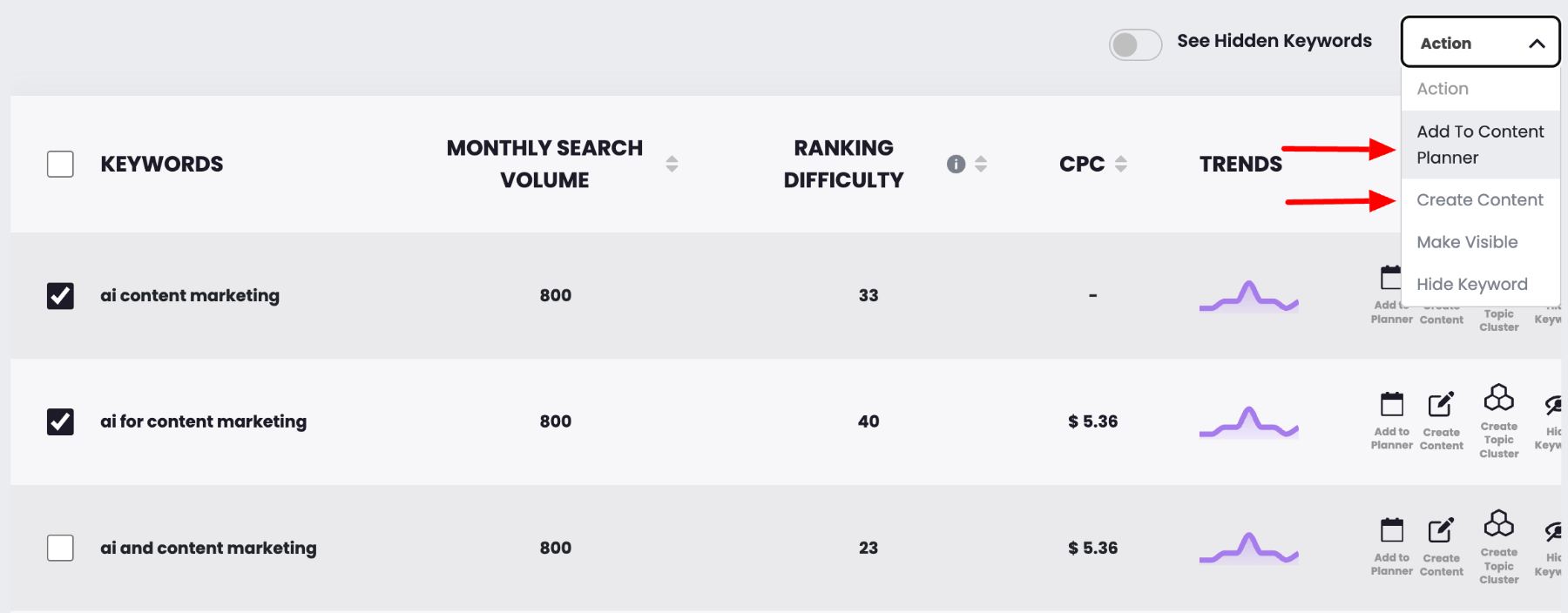
The beauty of BrandWell is that you don’t have to have different tools for keyword research and content creation. You get both in the same tool, streamlining your content creation workflow.
How Do I Find The Right “Keywords”?
Imagine trying to find a needle in a haystack. Sounds difficult, doesn’t it? Now, imagine if you had a powerful magnet that could guide you directly to the needle. Suddenly, the task becomes much more manageable. In the world of digital marketing, keywords are like that magnet.
They are the guiding force that connects a searcher’s query to relevant content on the web.
Here’s a robust guide on how to find low-competition keywords.
Understanding Keywords
A keyword, or keyword query, in the context of search engine optimization (SEO), is a word or set of words that internet users type into search engines to find specific information.
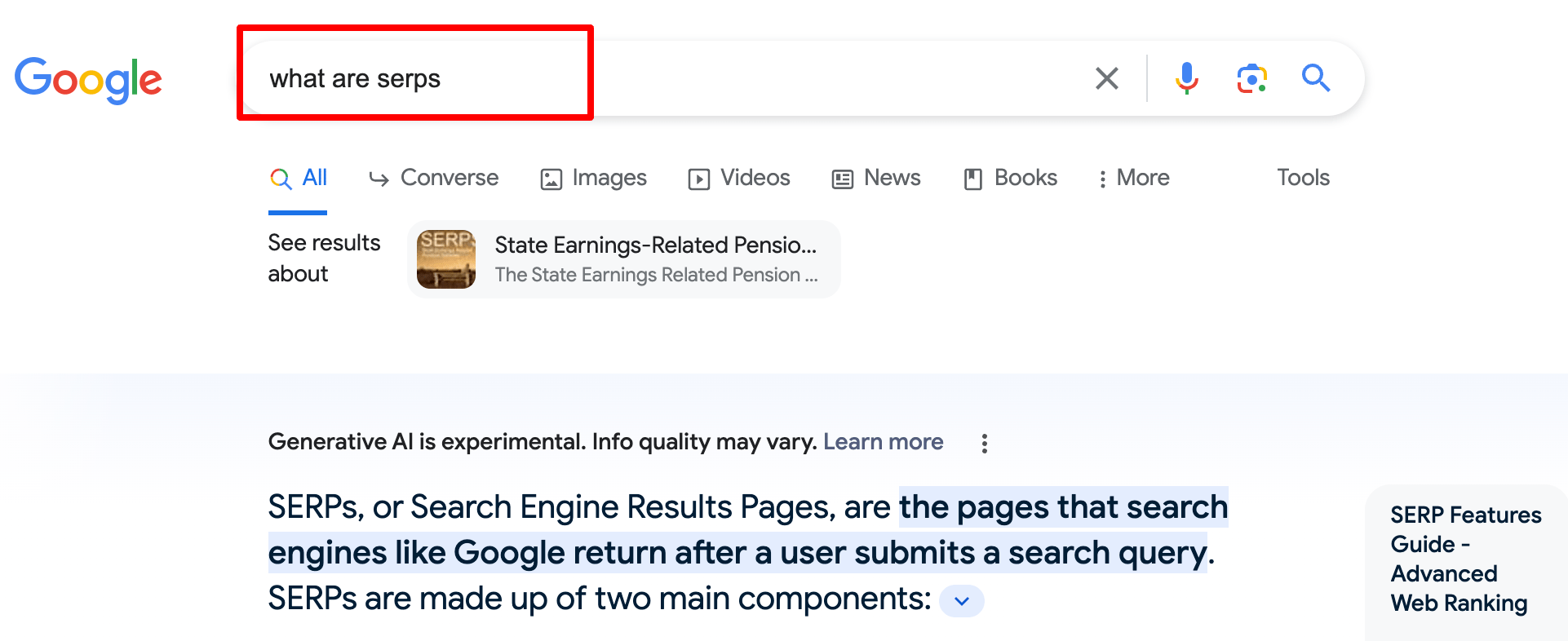
They are the queries, questions, and phrases that guide our online searches, helping us find the products, services, or information we’re looking for.
Whether a person is searching for “healthy dinner recipes,” “best hiking trails near me,” or “how to tie a tie,” they’re using keywords. Each search query represents a person’s specific need or question at that moment.
Understanding keywords helps you leverage Google search to grow your business.
The Role of Keywords in Content Marketing
Keywords serve as the bridge between the user’s search and the most relevant content related to that search. They are a crucial element of content marketing and SEO because they help content creators understand what their audience is interested in, and they enable search engines to match that content to relevant user searches.
Beyond Single Keywords: Long-Tail Keywords
While a keyword can be a single word, more often than not, it’s a phrase consisting of two or more words, known as a long-tail keyword. These are more specific and often less competitive than single-word keywords.
For example, “shoes” is a keyword, but “men’s waterproof hiking shoes” is a long-tail keyword.
Long-tail keywords allow you to target niche demographics more accurately and result in higher-quality traffic to your website.
The Power of Keywords
Keywords are the backbone of SEO and content marketing. They guide users to the content they’re seeking and help content creators target their audience effectively.
With a tool like BrandWell, you can harness the power of keywords to create high-quality, SEO-optimized content that meets your audience’s needs and boosts your visibility in search engine results.
Remember, just like a needle in a haystack, a well-chosen keyword can lead directly to the valuable content you’ve created.
What is Keyword Intent?
Keyword intent is the searcher’s desired outcome.
It’s what they expect to see after they press enter.
If you learn one thing from this article, it is to expect what the user is expecting. Start your strategy from there.
Pretty obvious.
If you agree with me, then you understand keyword intent.
How Can I Write an Article Using BrandWell with Proper Keyword Intent?
Writing an article with BrandWell is super easy if you know the keyword you’re targeting and the intent behind it.
The first step is to log into your BrandWell account and click the “Start Writing” tab.
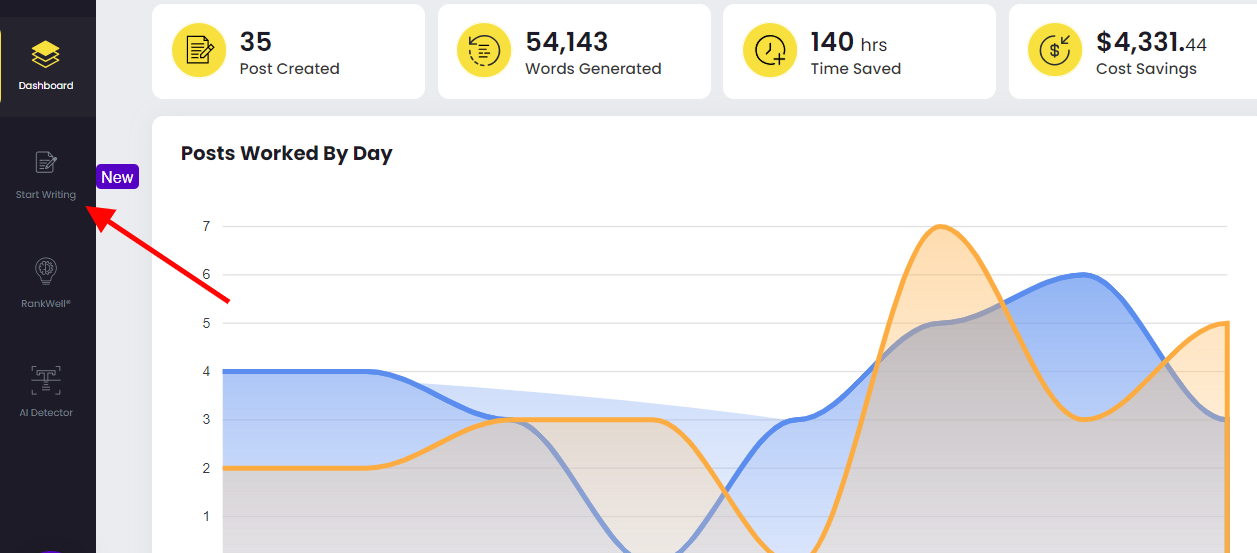
Next, select “Keyword” as your source and input your seed keyword.
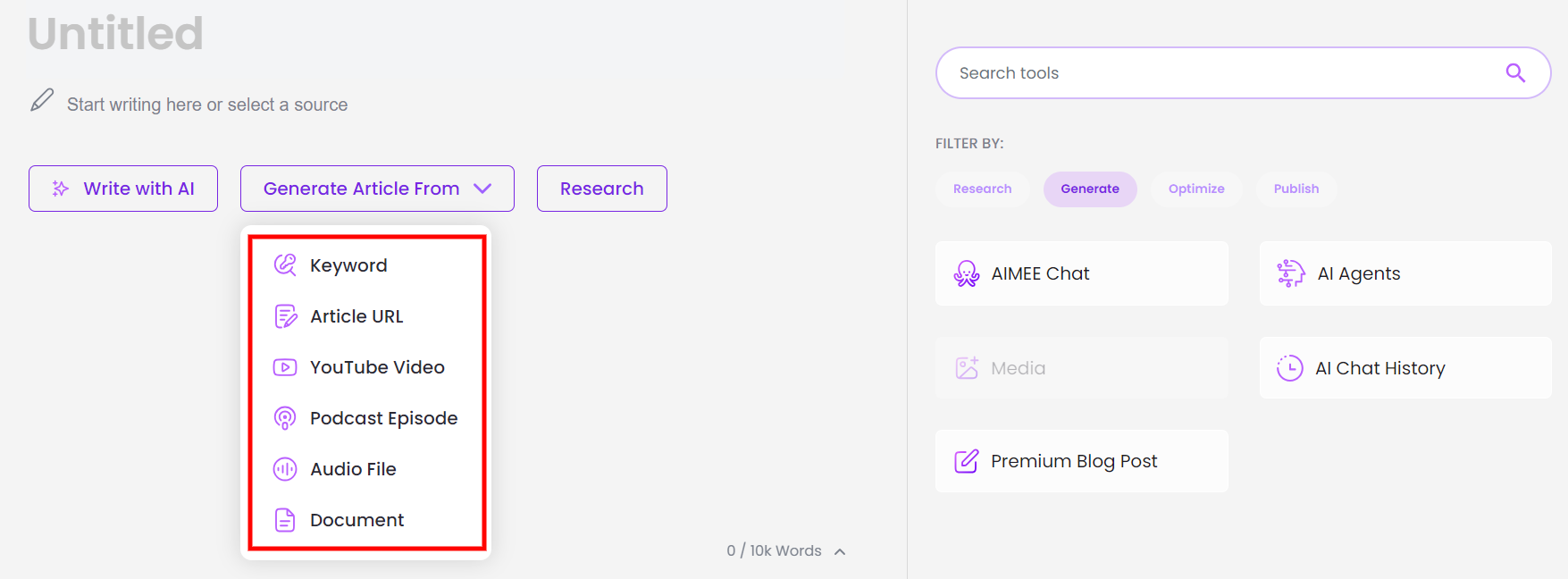
BrandWell will then generate a near-perfect article for you.
What Else Should I Know about Keyword Intent?
Now let’s get much more granular: if someone types “AI virtual assistants” into Google, they do not want to see search results about human virtual assistants who *use* AI.
What? Wait…why?
That’s because when people search Google for the keyword ai virtual assistants they’re almost always looking for “virtual assistant” as in the mobile software agent; not “virtual assistant” as in the occupation.
Take it or leave it, but that’s human nature, and Google understands it quite well.
People Google things because they don’t know about a topic and want to know more. In content marketing, we start with what they do know. The keyword they use will reveal what they do (and don’t yet) know.
We can meet them where they’re at.
Keeping that in mind, and keeping with the above example; a better keyword to target might be what is a virtual assistant.
Keyword intent is understanding the searcher’s desired outcome, and targeting the right keyword is crucial in meeting their needs.
Considering Keyword Intent is Crucial to Your Strategy
It is important to consider keyword intent when doing keyword research because it helps you understand the motivation behind a user’s search.
Does Google Know Users’ Search Intent?
Google is very good at inferring the intent behind a user’s search query. Google provides the most relevant and useful results based on the intent of the user’s search query.
Can I Change or Fight Against User Intent?
No.
I guess you technically can, but it’s very expensive and time-consuming. That’s probably not your priority.
If you mismatch user intent by using irrelevant or misleading keywords or content, you may attract the wrong audience to your website or content. This can lead to a high bounce rate, low engagement, and ultimately, a negative impact on your search engine rankings.
What Does This Mean For Me?
This means if you expect one thing and get another, check your keyword intent.
How do you check for keyword intent? You google the keyword and see what is on the page. That’s the type of content people expect when googling that keyword.
For example, if you optimize your content for a keyword that suggests informational intent, but your content is transactional, users who are looking for information will be disappointed and leave your site.
Or–again–if you target the keyword ai virtual assistants and write an article about *human* virtual assistants who *use* AI, then you’re going to have a hard time.
The Solution:
Hint: it’s intent. 😉
Expect what the user is expecting. And start your strategy from there.
Considering search intent when doing keyword research helps ensure that you’re meeting the user where they’re at; that your content aligns with the user’s needs and delivers relevant and valuable information, leading to higher engagement, better user experience, and increased likelihood of conversion.
How do I write better articles?
Use BrandWell. It literally does all the research and writing for you. It even does a round of editing all by itself before you ever see the written content.
The trick? There is none. Just type in the keyword you want to rank for. BrandWell does the rest.
Get an SEO-formatted, long-form blog article in a few minutes.
Keyword Intent is the #2 thing that will improve your content strategy.
What’s the #1 thing that will improve your content strategy? That’s BrandWell, of course.
NLP Optimization
Natural language processing (NLP) is a subfield of AI) that focuses on the interaction between computers and humans through natural language. NLP enables computers to understand, interpret, and generate human language in a meaningful and contextually relevant way.
BrandWell has powerful tools that help you optimize your output. One of those features is the NLP Optimization feature.
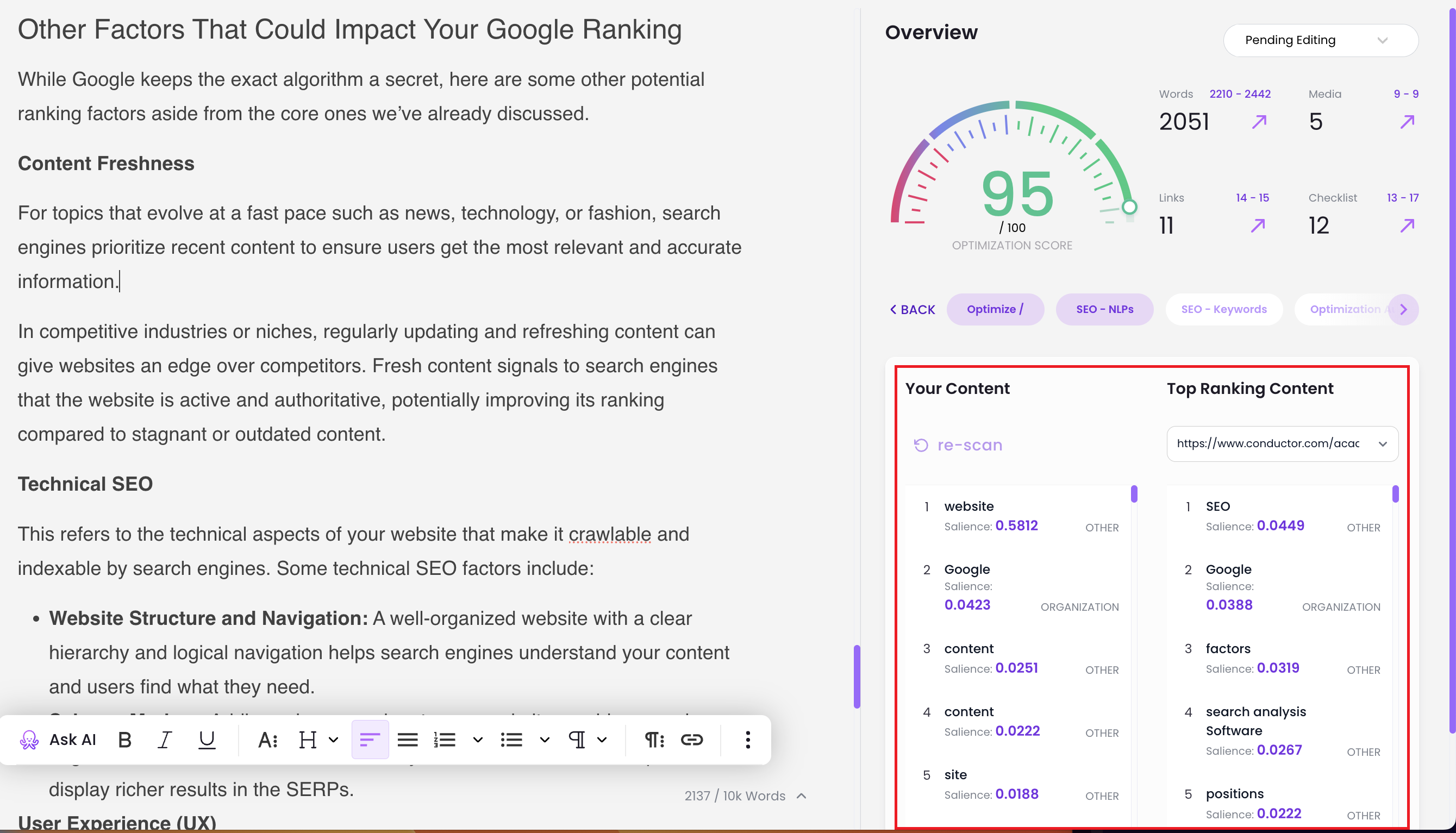
NLP optimization is the process of tailoring your content to make it clearer and more understandable for search engines (like Google) that use NLP to interpret and analyze content.
BrandWell’s NLP Optimization tool uses salience, a metric that determines the prominence or importance of specific terms or entities within a piece of content. This way, you get data on how important specific terms are for ranking purposes.
The major benefit of NLP optimization is that search engines can better understand your content. This, in turn, results in better indexing and ranking. Including NLP optimization in your keyword strategy should be a no-brainer if you want to outperform your competitors.
NLP optimization is a big differentiator as not many publishers are using it. So, give your brand that much-needed edge by going the extra mile in your content optimization.
Successful SEO is no longer just about keywords. It’s about much more than that. You need to get more granular and incorporate elements like search intent and NLP optimization, among others.
How Do I Choose a Keyword I Can Actually Rank For?
So you’re ready to write a blog post with BrandWell.
The most common way is to start with a keyword you want to rank for in search engines. But how do you choose a keyword that is competitive, relevant, and not too difficult so you have a chance to rank?
Here are the steps you need to take in researching keywords for your content.
1. Understand Your Target Audience
When you understand your readers’ needs, wants, challenges, and behaviors, it’s easier to identify relevant keywords that will attract them to your website.
Some questions to ask about your readers:
1. What are their demographic characteristics? (e.g., age, gender, location, income level)
2. What are their interests and hobbies? (e.g., sports, technology, fashion)
3. What are their primary challenges or pain points? (e.g., lack of information, high prices, time constraints)
4. What are the common search terms or keywords they may use when looking for products or services related to your industry?
5. How do they typically consume information or make purchasing decisions? (e.g., social media, online forums, word-of-mouth recommendations)
Creating content tailored to your target audience makes it easy to meet search intent. It also helps you meet Google’s Helpful Content Update requirements.
2. Conduct Keyword Research
Let’s try an example. If you run a vegan bakery in New York City, potential keywords could include “vegan cupcakes NYC” or “gluten-free pastries near me”. But don’t just pick any old keyword – ensure it aligns with user intent and business goals. This is keyword relevance.
- If you’re a local business, don’t forget to include location-based keywords. People often search for products or services near them, so make sure you’re showing up in those results. For example, “vegan bakery Brooklyn” or “gluten-free bakery Upper East Side.”
- Long-tail keywords are longer, more specific phrases that people use when they’re closer to making a purchase. They may have a lower monthly search volume, but they also have less competition. For example, “vegan birthday cake delivery NYC” or “gluten-free wedding cake bakery.”
3. Evaluate Search Volume
Search volume is like a popularity contest for keywords. The more people searching for a term, the more traffic you could drive to your site. In most keyword tools, you’ll find this labeled as monthly search volume, as most tools consider the average number of searches made in a month for that keyword.
High-volume keywords can bring many visitors, but they’re often competitive keywords, too. Conversely, low-volume terms may not bring in as much web traffic, yet they typically have less competition, making them simpler to rank for.
These so-called long-tail keywords can be incredibly valuable when building out your SEO strategy because they allow you to target niche audiences who are likely closer to making a purchase decision. They play a major role in the buyer’s journey.
If you have a fairly new website, target low-volume search terms.
4. Assess Competition Level
When it comes to keyword research, finding the right keywords is only half the battle. You also need to evaluate the competition level to determine if your SEO efforts will pay off.
For example, if you’re a small fish in a big pond trying to rank for the head keyword “vegan,” you’re going to have a bad time. Instead, focus on related keywords or long-tail phrases that are less competitive but still relevant to your content.
Keyword research tools can help you assess the competition level. Look for metrics like the number of companies bidding on each keyword, their ad spend, and the ‘Keyword Difficulty’ score. This score estimates how hard it will be to outrank existing top-ranking pages in Google results.
Keep in mind that high-competition keywords are often the ones that potential customers use most frequently when searching online. So, it’s essential to strike a balance between competitiveness, monthly search volume, and search intent when choosing keywords for your content.
Finally, as you assess the competition, keep an eye out for content gaps. These are opportunities for creating content your target audience is looking for but isn’t given much thought by publishers.
If you want to have a chance to rank with your content, choose keywords that:
- Match your target audience’s wants and needs.
- Match the search intent ( the main goal a user has when typing a query into a search engine).
- Doesn’t have very high monthly search volumes and competition.
- Are long-tail keywords related to your product or service?
What is Keyword Research? There’s More to it than Meets the Eye
I’m pretty sure you weren’t expecting a long article explaining keyword research.
However, I’m also sure you’ve realized that keyword research is super important in running successful SEO campaigns.
But rather than stopping at keyword discovery, you need to factor in other elements like intent, NLP optimization, content gap analysis, and much more.
If you’re to tap into Google’s search traffic by ranking for organic keywords (not relying on Google ads or other paid ads), finding the right SEO keywords to rank for is critical. And knowing how to use those keywords to create optimized content is even more important.
So, master the art and science of keyword research, build keyword lists, and delve deeper into understanding keyword optimization.




